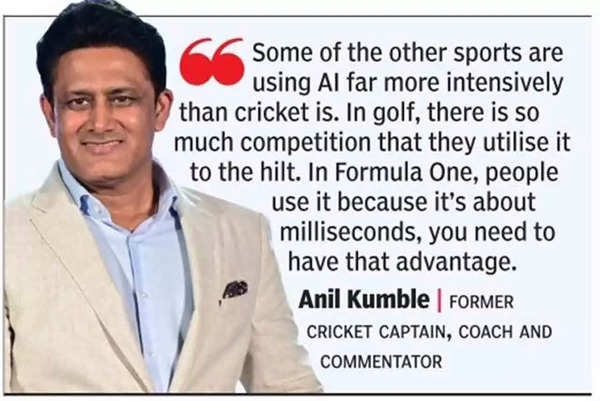Anil Kumble's early reputation as a studious cricketer stemmed not merely from the spectacles he sported. Even as he was luring batters to their doom, the champion leg-spinner was studying to secure an engineering degree.
Given his degree in mechanical engineering and his ability to analyse cricket to its minutest detail, it was inevitable that Kumble would lean heavily on technology post-retirement.
Thus was born Spektacom, whose flagship product is an AI-based
smart bat sticker
that provides real-time in -sights about a player's shots.
"There are plenty of opportunities to build on that (AI) because cricket is a highly statistics-driven game," Kumble says. "AI can be utilised in
coaching
, in talents couting, in selection of players, at auctions, even to formulate strategies around how one needs to bowl at certain batters, in which conditions. The biggest challenge in cricket is that it involves too many variables. But once you start inputting data,
AI
will be able to help you narrow it to a couple of the most important variables under given conditions."

Use in Predictions
Kumble says AI is currently being used mostly for analysis. The predictive and strategic elements of AI are still nascent. "The more you use the tech, the more you engage with the data points, the deeper and more scientific the system gets, and these tools will then give you a competitive edge over others who do not use the tech," he says.
Some of the other sports, he says, are using AI far more intensively than cricket is. "In golf, there is so much competition that they utilise it to the hilt. In
Formula One
, people use it because it's about milliseconds, you need to have that advantage. I didn't know until recently that fencing uses a lot of tech. Cricket is way, way behind in terms of utilisation of tech."
Kumble says AI is all about data. "With existing open-source tools, you can build an algorithm that can help you decode so many things - and faster. You can even do it in real time."
With the smart bat sticker, for instance, if you are given 100 balls to hit, the smart sticker could identify that you have hit only 20 from the sweet spot. Then the next step would be to improve that number by changing your grip, stance, or the way the bat is swung, or to watch the ball closer. But there could be an issue with the bat itself. "If the smart sticker shows that while only 20 balls hit the sweet spot, 70 hit one inch above the sweet spot, then that helps you figure out if you can push the sweet spot higher or use a slightly longer blade or a longer handle to improve the efficiency of stroke-making," Kumble says. The model, he says, also understands the way you bat and makes automatic corrections to the algorithm.
Delighting Fans
AI, Kumble says, can also enhance fan experience with the insights it provides, and facilitate interaction. Its predictive touch, he says, will add greater charm and possibilities.
He says technology replacing the human element is not a bad thing in itself. "What we must be careful about is the introduction of the tech itself. You need to deep-dive, test, ensure the tests are also done live. Currently, no tests are being done live, it's all in lab conditions. Testing live is very difficult."
R Kaushik is a cricket writer & author









 English (US) ·
English (US) ·